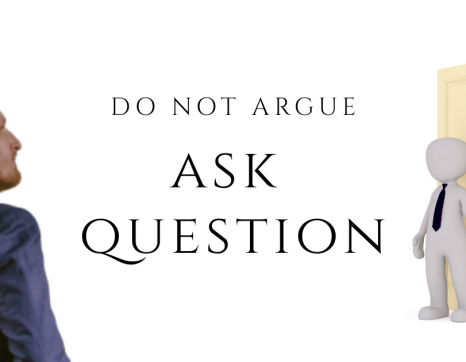
Don’t argue – Ask questions
As the saying goes “It takes two to tango.” Well, it also takes two to argue. It is impossible to have an argument with someone if they don’t participate. If your goal is to reach a solution and create a win/win outcome, arguing isn’t the route to take. Instead the best way to reach a collaborative conclusion is to ask questions.
We are taught to ask questions in coaching so the other person can hear in their own words the solutions. In fact it is said that coaches do not ask questions so they can hear the answer, but so the client can hear the answer. Questions allow the person to take ownership and responsibility for the solution. Although there are times, when coaching a client, that I already know the answer. It is more powerful to allow my client to come to it on their own in their own words. The same works in an argument. If all you want to do is argue, questioning isn’t likely to be helpful. If you want to co-create a solution questioning can assist in creating a solution that will be agreeable to both parties.
As an adjunct faculty member at a local University, I find that it is useless to argue or try to reason with students when talking with them about their grades. The student always begins the conversation believing I am wrong and they are right . . . the foundation to arguments. By asking simple questions such as “What do you think your grade should be?” or “If you were the professor how would you grade the paper?” the student begins to see the problem from a different perspective. Most of the time the conversation ends with the student accepting the grade or at least understanding why they earned it. Questioning allows them to work through the problem and think about it in a different way.
I find this process helpful anytime there is conflict. I found the process of asking questions to be extremely valuable when making a custom order at my local hardware store. I had followed the directions in the electrical department that advised me to take my custom order to the cashier and they would place the order, bill me and arrange for shipping. When I did that, the cashier was completely confused and called Gloria the head cashier over. Gloria proceeded to tell me that I was wrong and I would have to go to another department to place the order. I showed Gloria the instructions, but it was clear she wasn’t interested. Instead of arguing with her, I started asking questions. I started with the most important one, “Gloria, how are we going to resolve this?” I stayed calm and focused on the goal to get the order placed. Gloria wasn’t happy about helping me. However, in the end I got what I wanted without arguing about it. Questions helped Gloria and I stay focused without arguing.
Unless you just want to have a good argument, avoid defending your position and focus on asking questions. Questions take the heat out of the situation and allow both parties to view the problem from a different perspective. Even if you know the answer, the other person will be more open to the solution if they are allowed to discover it on her or his own.

Tim has background as is business psychologist and work sociologist with expertise in building organisations and teams to solve problems for the future. Tim has expertise in technology and the symbiosis between human interaction and technology in operational processes.













